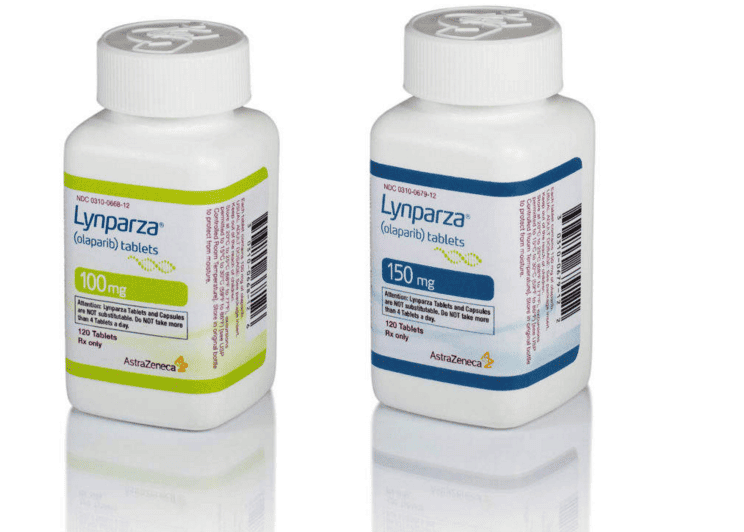
AstraZeneca’s Lynparza has become the first PARP inhibitor to be approved for first-line maintenance therapy in BRCA-mutated ovarian cancer, giving the drug another leg-up over its rivals.
The new FDA approval means that Lynparza (olaparib) can be given to patients who are in complete or partial response to first-line treatment with platinum-based chemotherapy for ovarian, fallopian tube or primary peritoneal cancer, in order to reduce the risk of relapse or disease progression.
At the same time, the FDA has extended the indications for Myriad Genetics’ BRACAnalysis CDx diagnostic to allow it to be used to select eligible women for Lynparza treatment.
Updated results from the SOLO-1 trial which supports the new approval were reported at this year’s ESMO conference in October and showed that 60% of patients receiving Lynparza remained progression-free at three years compared to 27% of a placebo group, with preliminary data a four years putting those proportions at more than 50% and 11%, respectively.
Extending the use of Lynparza to this patient population opens up a big new market for the already fast-growing drug, which is at the heart of a renaissance for AZ in oncology as well as the cornerstone of a strategic alliance with Merck & Co/MSD, which co-markets the drug. EvaluatePharma forecasts that Lynparza will hit annual revenues of $2.2bn by 2024.
Lynparza is already well in front of its PARP inhibitor rivals, Tesaro’s Zejula (niraparib) and Clovis Oncology’s Rubraca (rucaparib). All three are already approved for maintenance in relapsed/refractory ovarian cancer, but first-line approval allows Lynparza to move up the treatment pathway ahead of its competitors.
Tesaro – in the process of being acquired by GlaxoSmithKline – is expecting phase 3 results in the same setting for Zejula next year, while third-to-market Clovis has taken a different tack, focusing its first-line maintenance efforts on a combination study of Rubraca with Bristol-Myers Squibb’s checkpoint inhibitor Opdivo (nivolumab) in ‘all-comer’ first-line ovarian cancer, i.e. both BRCA-positive and BRCA-negative patients.
More positive data
There was further good news for AZ today from the SOLO-3 trial in patients with BRCA-mutated ovarian cancer who had relapsed after two or more prior lines of treatment. Lynparza is already approved for this group but agreed to carry out this phase 3 study as a condition of accelerated review.
The study showed Lynparza achieved a statistically-significant and clinically-meaningful improvement in objective response rate (ORR) and progression-free survival (PFS) compared to chemotherapy, says AZ, though it isn’t releasing the data yet.
It is “the first phase 3 trial for a PARP inhibitor to demonstrate a positive result versus chemotherapy in advanced ovarian cancer where effective options are needed,” said AZ’s chief medical officer Sean Bohen.
And in another positive development, AZ also announced today that two additional phase 3 trials of its just-approved drug for anaemia in chronic kidney disease patients – roxadustat – backed the efficacy of the drug.
The ROCKIES trial revealed a significant improvement for the oral drug in haemoglobin versus injectable epoetin alfa in dialysis-dependent CKD patients, the patient population for which it has just been approved in China.
Moreover, the OLYMPUS trial reveals a similar outcome in less sick CKD patients who haven’t yet needed to start dialysis therapy, potentially opening up a much larger market for the drug.




